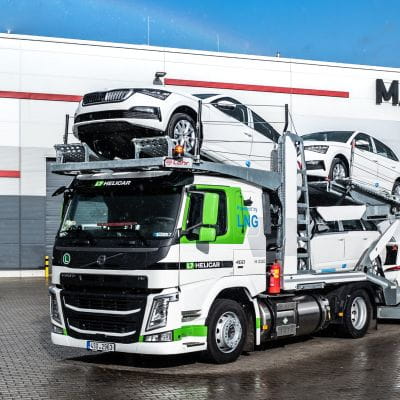What is LNG?
The Liquefied Natural Gas (LNG) is formed by cooling and condensing natural gas into a liquid state. Natural gas is cooled to a very low temperature, approximately -160 °C.
Liquefied natural gas is approximately 600 times smaller in volume than gaseous natural gas, which is a major advantage not only for storage and transport, but also for use in freight transport. It is shipped from gas fields to various outlets by specially adapted tankers.
LNG, like natural gas, is mostly methane (90-100 %), but also contains residues of ethane, propane, higher hydrocarbons, nitrogen and other gases. Before natural gas can be liquefied, it must be cleaned of unwanted impurities. Its heat of combustion (calorific value) is usually around 55MJ/kg. It is a bluish, non-toxic, non-corrosive, clear liquid with minimal viscosity.
LNG in Europe

Increase the efficiency of your business with your own LNG station.
An in-house LNG station is the optimal solution for anyone who handles large volumes of transported goods.
For whom is LNG suitable?
LNG is today one of the most interesting forms of energy used in long-distance road transport, shipping and rail transport, as well as in industry for energy and heat processes in companies not connected to the natural gas distribution network.
In the local conditions of the Czech Republic, the use of LNG in road transport as an ideal fuel for heavy goods vehicles is essential. LNG is thus an efficient solution for hauliers, logistics companies or utilities.
Do you operate a fleet of trucks and are you considering upgrading it? Then you might be interested in LNG propulsion, an economical and environmentally friendly alternative to diesel. Compared to diesel, it is not only more eco-friendly but also more fuel-efficient. LNG vehicles can travel up to 1,500 kilometres on a single fill-up.
Do you know that:
- An LNG truck or bus can go from Prague to Paris, for example, on a single refuelling.
- GasNet offers a complete service for the design of private refuelling stations, including the subsequent operation and delivery of LNG.
- It only takes 5-10 minutes to refuel a car with LNG. It is therefore comparable to the time it takes to refuel a conventional truck.
Technology used in the vehicles
LNG engines are of two types: spark-ignition engines with spark plugs operating on the principle of a petrol engine (the fuel is 100% LNG) and diesel engines with a dual fuel system (the fuel is 95% LNG and 5% diesel, with the diesel acting as a medium to ignite the mixture).
The LNG tanks are super-insulated double-walled vessels in which LNG is transported at relatively low pressures (up to 16 bar). LNG tanks are designed by the manufacturers to have maximum durability. They can be adapted to the individual requirements of different transporters or industries.
Before the natural gas is cooled and liquefied, unwanted impurities such as carbon dioxide, hydrogen sulphide, nitrogen, water and heavy hydrocarbons need to be removed. Pure gas treated in this way consists of approximately 95 % or more of methane, the other components being up to 5 %.
For information on LNG technology used in freight transport, please contact your preferred manufacturer directly.
Fuel station technology
LNG stations are characterised by their simple design, quiet operation and, above all, comparable refuelling times to diesel.
LNG is stored in cryogenic tanks at very low temperatures and the used technology reflects this.
The refuelling station can hold approximately 25 tonnes of LNG, which equates to approximately 160 refuelling operations.
Benefits of LNG
-
LNG
LNG is liquefied natural gas and an ideal fuel for freight transport. -
SAVINGS
LNG-powered trucks allow companies to reduce fuel costs. -
ECOLOGY
Reduction of NO by 70% and CO2 by 20% compared to diesel. LNG is the path to meet EU emission standards in road freight transport. -
NOISE
Noise reduction of up to 9 dB compared to diesel. -
ADDITIONAL BENEFITS
You can drive up to 1,500 km on a single LNG fill-up.
It has the advantage of exceptionally low emissions of nitrogen oxides, particulate matter and carcinogenic hydrocarbons, the substances with the worst impact on human health, compared to diesel. LNG engines are also quieter, which is an advantage, for example in urban areas. In addition, LNG trucks save on fuel costs.
Financial savings
- LNG trucks allow companies to reduce their fuel costs
- With a long range of up to 1,500 km, they do not require a dense network of refuelling stations.
Ecology
- The use of LNG trucks is a path to meet the European Union's emission limits by 2030.
- Compared to diesel, LNG is a clean fuel that produces fewer emissions. Carbon dioxide emissions are reduced by up to 20%, sulphur oxide emissions by up to 100%, nitrogen oxides by up to 90% and particulate matter by up to 99%.
- If LNG leaks from the tank, it evaporates quickly, and because methane molecules are lighter than oxygen molecules, it rises quickly upwards and there is no risk of it accumulating in drains or under vehicles. LNG is a non-toxic substance that leaves no residue in water or soil.
Other advantages
- LNG vehicles are up to 9 dB quieter than diesel engines.
- This gives them better access to city centres where restrictions on entry may apply due to noise and emissions standards. They are therefore also suitable for night-time unloading of goods.
- Low winter temperatures have less effect on vehicle starting and thus on engine wear. LNG also does not form carbon deposits and therefore has a positive effect on engine and engine oil lifespan.
- As a fuel, LNG cannot be stolen or its consumption manipulated in any way.


